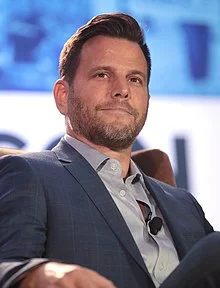
Dave Rubin
Dave Rubin is a prominent American political commentator, author, and talk show host known for his thought-provoking insights on contemporary issues. Born on June 26, 1976, in Brooklyn, New York, Rubin began his career as a stand-up comedian before transitioning into political commentary. He gained widespread recognition as the host of "The Rubin Report," a long-form interview show where he engages with a diverse range of guests, fostering open and civil discussions on topics ranging from politics and culture to free speech and individual liberties. Rubin is a staunch advocate for classical liberal principles, advocating for free speech and open dialogue, often challenging prevailing ideological norms. He has authored a book, "Don't Burn This Book: Thinking for Yourself in an Age of Unreason," which further explores these ideas. Through his work, Dave Rubin has become a prominent figure in the online discourse, promoting the values of intellectual diversity and respectful debate.
The Intellectual Awakening: Rubin and Rogan Discuss Change, Peterson, and Society
In a revealing conversation between Joe Rogan and Dave Rubin on the Joe Rogan Experience, the duo delves into the dynamics of societal change, personal growth, and the impact of long-form discussions in today’s fast-paced world. Rubin, fresh from touring with Jordan Peterson, shares insights into what he describes as a significant awakening happening across the globe. People are beginning to challenge the status quo, seeking deeper understanding and clarity beyond mainstream narratives.
The Peterson Phenomenon
Rubin highlights Jordan Peterson’s influence as a pivotal element of this awakening. Despite widespread misrepresentation of Peterson’s views, the crowds flocking to his talks are not the monolithic group critics suggest. Instead, Rubin paints a picture of diverse audiences united by a quest for meaning beyond surface-level identity politics.
Identity Politics and Its Discontents
The conversation touches on the divisive nature of identity politics, with Rubin critiquing its prevalence on both the left and the right. He argues for a return to individualism, where the content of one’s character trumps immutable characteristics. The discussion reveals a shared concern over the increasing tendency to categorize and judge individuals based on group identity rather than personal merit.
Towards a More Nuanced Understanding
Both Rogan and Rubin lament the oversimplification and polarization in public discourse, advocating for a more nuanced approach to complex issues. They discuss the importance of dialogue and the exchange of ideas as tools for bridging divides and fostering a more inclusive society.
In essence, Rubin and Rogan’s dialogue underscores the critical need for open conversation in an era of rapid change and uncertainty. By embracing complexity and engaging with diverse perspectives, they suggest, society can navigate the challenges of the 21st century with wisdom and resilience.
The Challenge of Free Speech in the Digital Age
The discussion pivots to the critical issue of free speech, particularly in the context of digital platforms. Rubin emphasizes the complex relationship between technology companies and content creators, highlighting the challenges and responsibilities in managing free expression online.
Social Media: A Double-Edged Sword
Both Rogan and Rubin delve into the impact of social media on public discourse, debating its role as both a facilitator of open dialogue and a catalyst for divisiveness. They explore the nuances of online communication, where the benefits of global connectivity are often shadowed by the spread of misinformation and echo chambers.
Navigating the Media Evolution
As the conversation unfolds, Rubin reflects on the shifting dynamics of the media industry. He notes the growing skepticism towards traditional news sources and the rise of alternative media platforms. This segment underscores the importance of critical thinking and the pursuit of diverse perspectives in understanding complex issues.
